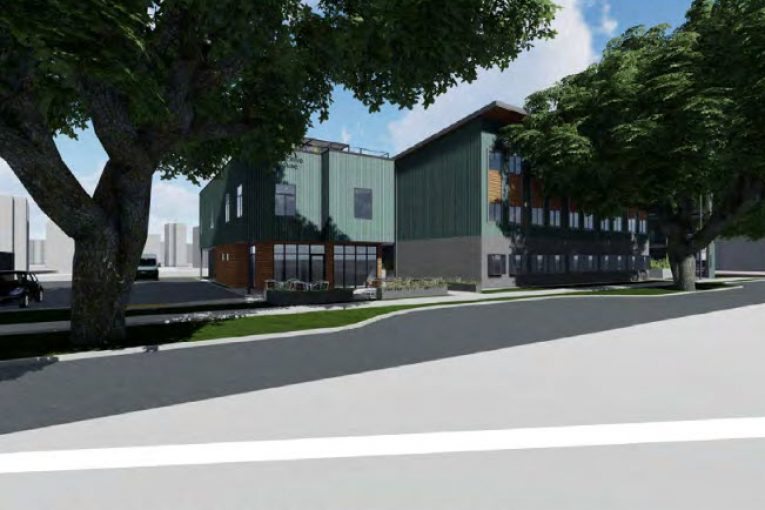
 By David M. Greenwald
By David M. Greenwald
Executive Editor
Davis, CA – In March, the Planning Commission gave the Olive Drive Mixed Use project the go ahead to proceed to the council—they have advisory recommendation while the council makes the final decision on land use projects. However, on April 4, Alan Hirsch filed an appeal to the recommendation of approval.
The Olive Drive Mixed Use project combines four parcels on approximately half an acre of land (0.56 acres) along Olive Drive.
The applicant is proposing to redevelop the vacant parcels with four residential apartment buildings containing a total of 47 one-bedroom apartment units, approximately 100 sf of office space, and approximately 900 sf of ground floor commercial space.
Access to and from the project will be off of Olive Drive. Staff explains, “The  project as currently proposed would eliminate all four existing driveways, and provide a single driveway off of Olive Drive.”
project as currently proposed would eliminate all four existing driveways, and provide a single driveway off of Olive Drive.”
Staff explains, “To address the potential of having multiple driveways near the intersection of Olive Drive and Richards Boulevard, staff recommended for the applicant’s consideration an alternate site plan that would provide for a shared driveway between the Davis Mobile Home Park, Design House property and the subject project.”
However, the applicant has provided a modified site plan showing “a combined driveway from the proposed project with the existing driveway currently serving the Davis Mobile Estates.”
The applicant proposes to provide a total of 8 parking spaces, of which 4 will be assigned to the commercial and office uses, three to residential use and one to Zipcar.
Ordinarily the Municipal Code would require 47 parking spaces—one per each one-bedroom unit, plus three for the retail and one for the office for a total of 51 spaces.
According to the applicant, the project’s “goal is to reflect promotion of alternative transportation modes, such as walking, biking, ride hailing and public transit in pursuit of a designation of a Transit Priority Project. …, the project’s proximity to bus and train depots, several of the City’s Unitrans stops, the downtown, and UC Davis grocery, and medical services (within a 15-minute walk) all support alternative modes of transportation. The project will separately charge tenants for these 3 spaces which alone should discourage tenants from driving. The project also will provide a Zip Car on site for the use of the tenants.”
Staff writes, “The applicant believes these explanations justify reduction of the required parking spaces as proposed.”
In his appeal, Hirsch argues that the conditions involve trees and bike parking, and these changes were made, without Tree Commission or arborist review, by planning staff which involved “significant loosening of planting standards and lack of enforcement to assure trees thrive.” Further, “conditions have no clear mitigation that should address social equity for unpermitted illegal removal of 28 trees.”
Furthermore, he argues there is “inadequate bike parking standards determined without study of need.” And “no payment to support better bike stop.”
Staff responds, “The City’s appeal process is in place to allow an appellant the opportunity to seek reversal of a decision.” However, “In this case, the Planning Commission is not the final decision-maker on the proposed project, but rather an advisory body that made a recommendation. If the City Council were to uphold the appeal, thereby granting the appellant’s request to not consider the advisory recommendation from the Planning Commission, the applicant will technically be denied due process as no public hearing would be given to the proposed project.”
Staff therefore concludes that “given that the review and decision process will end with the City Council, and not the Planning Commission, the appellant still has the opportunity to raise their concerns about the project through the public hearing process, without the need for an appeal.
“The City Council is required to hold a public hearing on the proposed project. The grounds for the appeal may be considered by the City Council during the public hearing on the proposal. However, staff does not believe that the City Council should uphold the appeal prior to holding a public hearing, and, technically, the City Council could not delay the appeal to hold a public hearing on the project either. Therefore, staff recommends that the City Council deny the appeal.”
Staff responds to the specifics as well.
First they argue that the proposed project does comply with the city’s bike standards. They write, “The proposal is in keeping with the City policy to grow inward, rather than sprawl. Staff cannot identify any issue with the proposed land use change to provide a different housing type in the City.”
With respect to trees, “The appellant’s dedication to ensure survival and retention of trees in all development projects throughout the City is praise-worthy. However, the City has to operate on existing standards until such time as a new standard is adopted by the City Council to address some or all of the appellant’s tree issues.”
They also find, “Adequate bike parking spaces consistent with City code is provided by the proposal.”
Moreover, they find, “The proposed project applications do not require a review by the Tree Commission. Internal review that included the City Arborist was conducted, and appropriate conditions of approval recommended for City Council consideration and approval.”
The city concludes, “While there are values to ensuring a robust urban forest within the City, the current standards do not go as far as those being proposed by the appellant. Until new standards are in place to accommodate the views expressed by the appellant, the City cannot change its standards on a project by project basis.”

